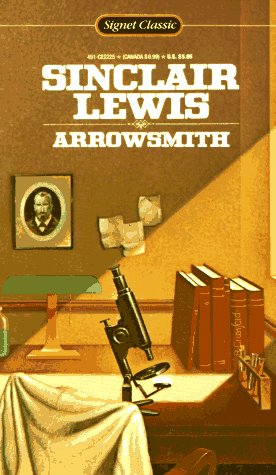Books |
Arrowsmith
Sinclair Lewis
By
Published: Mar 28, 2017
Category:
Fiction
Since the election, classic dystopian fiction has become a Thing. One of those novels is about fascism coming to the United States: “It Can’t Happen Here,” by Sinclair Lewis. [To buy the paperback from Amazon, click here. For the Kindle edition, click here.] If you want to be spooked, it’s a must-read. But if you want to be challenged and inspired…consider “Arrowsmith.”
Sinclair Lewis is the bookend to F. Scott Fitzgerald. Both were born in Minnesota. Fitzgerald went to Princeton, Lewis to Yale. Both wrote their best books in the 1920s. Both drank, had women trouble, and turned bitter.
But Fitzgerald is everyone’s favorite author — even the high school kids who are clueless about metaphors swoon over “The Great Gatsby.” You need an appreciation of satire to love Lewis; nobody does, and he goes unread.
It’s understandable. What would you rather read — a romantic tale about a poor boy’s rise and violent death on the glittering shores of Long Island (“Gatsby”) or a withering take on narrow-minded life in the midwest (“Main Street”)? Who’s more interesting — a criminal who went to Oxford (Jay Gatsby) or a blowhard whose ambition is total conformity to soul-deadening values (George Babbitt)?
And yet. If you ask who describes America better, the more necessary writer is Sinclair Lewis. "Main Street" and "Babbitt" made his name, and most readers stop there. They shouldn’t. "Dodsworth" — later made into a toweringly great movie — is as fine a love story as Fitzgerald ever dreamed up, and a lot more realistic one, at that.
And then there’s "Arrowsmith", which has an actual hero. Set in the midwest, it doesn’t lack for satire; as Lewis depicts it, happiness in a small town seems to have the shelf life of about a year. It’s an uneven book; for a writer who won the Pulitzer Prize (and refused it), Lewis can write some dreadful dialogue. But the heroism thing — that’s compelling, and if you can move sprightly through the first half of the book, you’ll find yourself getting excited and turning pages quickly for the right reason. [To buy the paperback from Amazon, click here. For the Kindle edition, click here.]
The hero is Martin Arrowsmith. We meet him in 1897, in the midwest town of Elk Mills (“a dowdy red-brick village, smelling of apples”), where he is the 14-year-old helper of the local doctor. Martin is prone to hero worship — he sees magic in the old man’s love of puttering in a lab. That ignites a dream, and so, seven years later, Martin’s in medical school. There he falls under the spell of his next hero, bacteriology professor Max Gottlieb: “tall, lean, aloof” — and a Jew.
Gottlieb’s love of science is pure; in an environment where many students and faculty think only of money, he alone seems to have ideals. Martin blossoms. But he’s still a rube. He falls for a snooty graduate student in English and proposes marriage; later, he meets Leora, a nursing student, and proposes to her as well. His inept solution: to bring them together over lunch. Leora loves him more. They marry.
Leora’s family is important — in their tiny town of Wheatsylvania, North Dakota. But don’t call them cultured: They lived in a house “that has a large phonograph but no books.” Money talks, though. They bankroll Martin’s first practice, and he settles into the life of a country doctor.
The novel is about the impossibility of “settling” — Martin can’t ignore research, his first love. He has a knack for it, and, to his delight, he’s invited to join Gottlieb at a prestigious New York research institute. And now the novel kicks into high gear — the plague has broken out in the Caribbean, and the vaccine that Arrowsmith has been working on might just be the cure.
Let me not spoil the thrill of these pages by revealing too much. Let’s just say: success always comes at a price. And success doesn’t always bring people what they most want. “Arrowsmith” is a book about the forces that fight to dominate us. As Lewis has it, that fight never ends.
“Arrowsmith” is smart about the world of research, and drug companies, and the modest ambitions of many men and women in white coats. It is also about the love of knowledge and the desire to heal; it gets the blood pumping. Richard Kornbluth — my brother, one of our best AIDS and cancer researchers — tells me that “Arrowsmith” is the book that made him decide to study medicine. Long before page 450, I could see why.


